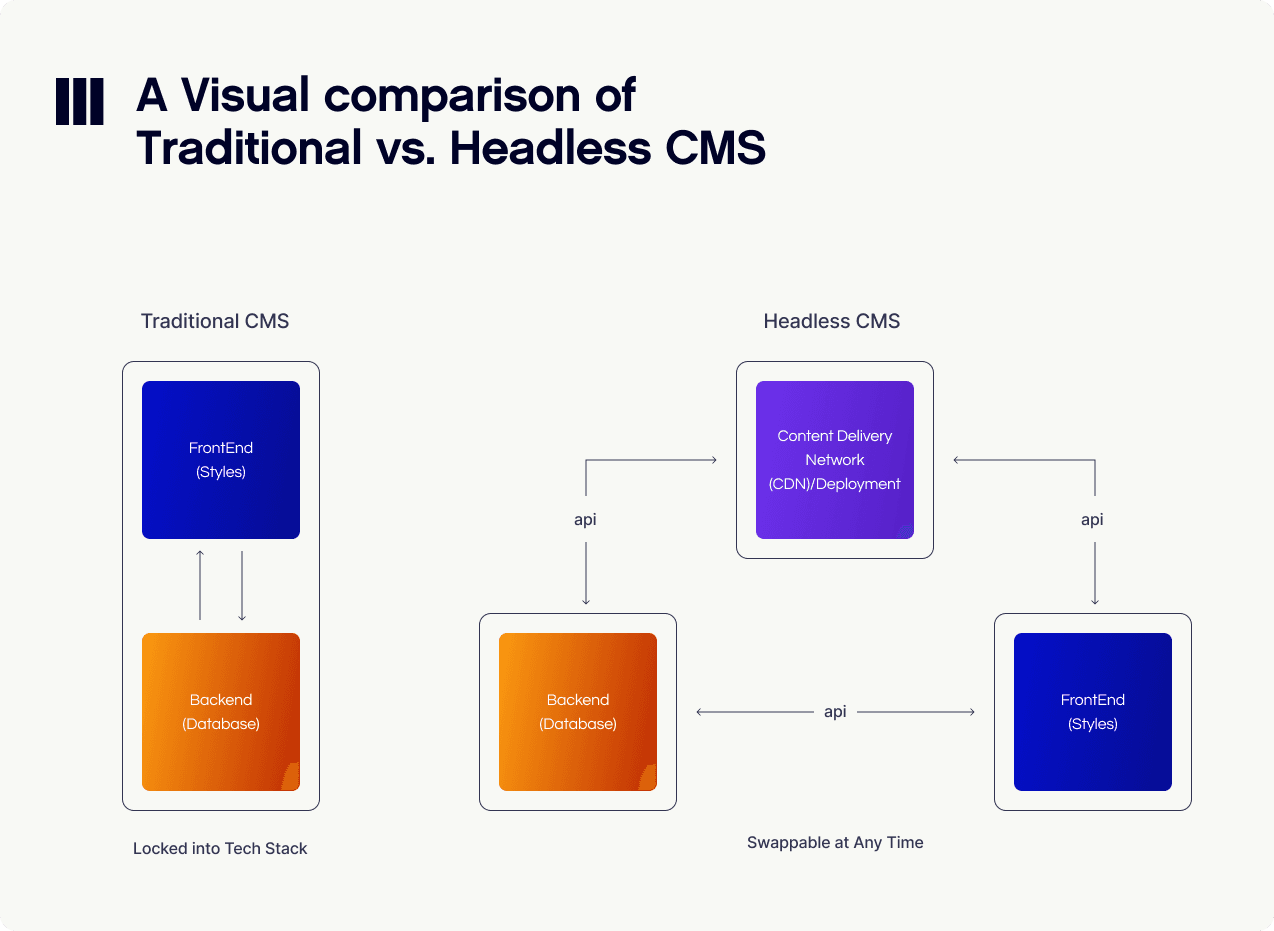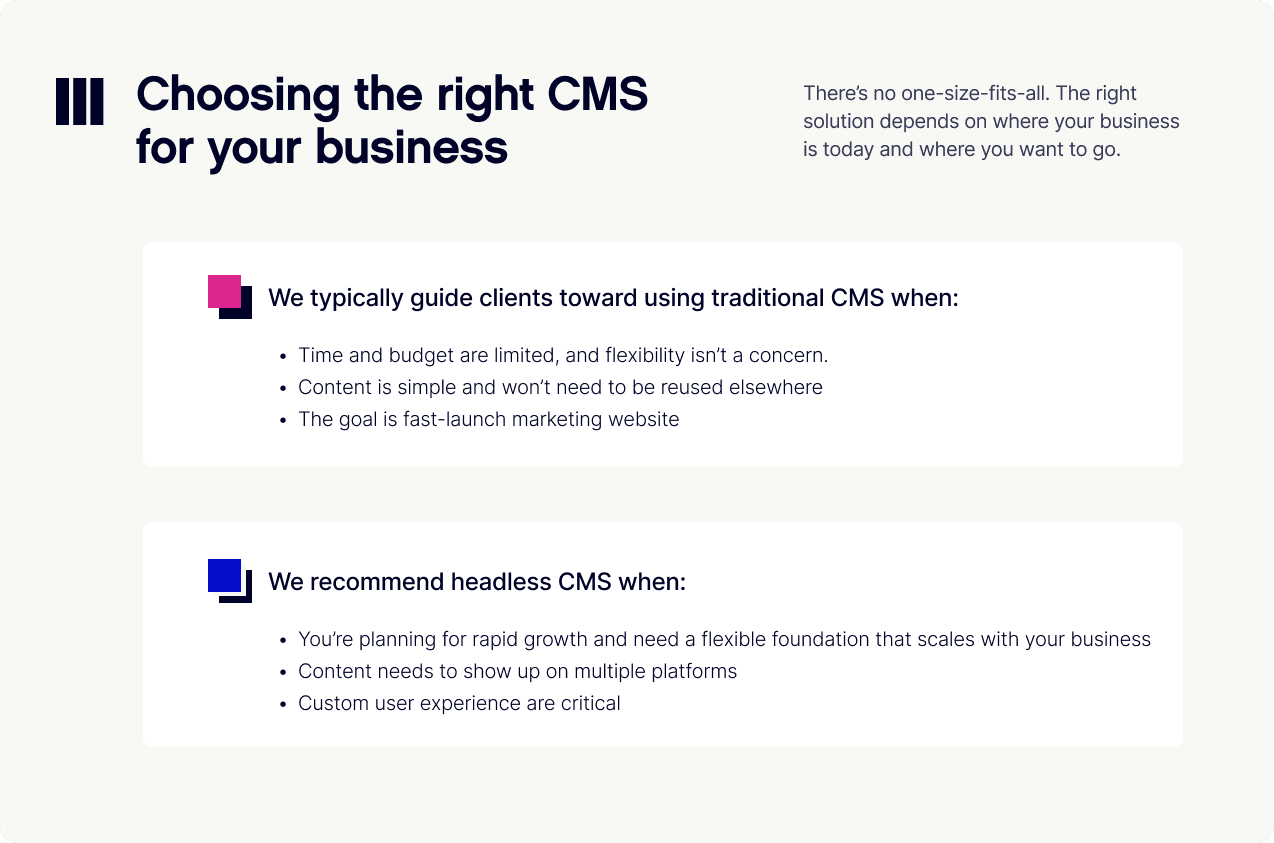0.00%

Technology
Traditional vs. Headless CMS: What’s right for a scaling business?
When choosing the best CMS platform for your digital presence, understanding the difference between Contentful vs WordPress is essential. Both are popular CMS platforms but serve different purposes and audiences. Whether you're managing a simple marketing site or building complex multi-channel digital experiences, this guide will help you make an informed choice.
What is a Traditional CMS?
A traditional content management system (CMS) like WordPress bundles content management, presentation layer, and hosting into one cohesive platform. WordPress, originally created as a blogging platform, has evolved into a full fledged CMS powering millions of websites, including blogs, online stores, and business sites.
WordPress offers a user-friendly interface with a WYSIWYG editor, making it accessible to content editors and non technical users. Its open source nature and large developer community have contributed to a vast ecosystem of themes and plugins, including popular SEO tools like Yoast SEO and All in One SEO Pack. These third party plugins enable easy SEO optimization, media management, and customization of WordPress sites without coding skills.
With WordPress, you can quickly create and publish content such as blog posts, product pages, and web pages. The platform supports extensive customization through additional content types, taxonomies, and third party modules, allowing you to tailor your site to unique business needs. Hosting is flexible, with numerous options ranging from shared hosting to managed WordPress hosting.
What is a Headless CMS?
Contentful is a leading headless CMS platform that separates the content management backend from the presentation layer. Unlike WordPress, Contentful does not dictate how content is displayed. Instead, it offers an API first approach, enabling developers to create custom content models and deliver content to any digital channel—websites, mobile apps, IoT devices, and more.
Contentful’s composable content platform empowers developers to build custom solutions using popular programming languages and frameworks. Its rich text editor and comprehensive documentation make it easier for content editors and marketers to create and manage content without worrying about the front end.
Because Contentful delivers content via RESTful APIs and GraphQL, it is highly scalable and ideal for larger enterprises needing multi-channel delivery and complex workflows. It offers role based access controls, automatic updates, and a free plan to get started. Contentful’s pricing plans scale with your usage, making it suitable for small businesses as well as global brands.
Contentful vs WordPress: Key differences
Wordpress | Contentful | |
|---|---|---|
CMS Type | Traditional CMS (Monolithic) | Create custom content models; highly extensible |
Interface | User friendly WYSIWYG editor | SEO depends on front end implementation |
Customization | Themes and plugins, extensive third party add ons | Content delivered via APIs to multiple channels |
SEO Optimization | Built-in SEO tools and popular plugins like Yoast SEO and SEO Pack | Highly scalable, ideal for large enterprises |
Content Delivery | Coupled content and presentation | Developer friendly; requires coding for front end |
Scalability | Suitable for small to medium sites; scaling requires effort | Free plan available; paid plans based on usage |
Developer Involvement | Minimal for basic use; advanced customization requires coding | Developer friendly; requires coding for front end |
Pricing | Free core; costs for hosting, premium themes, and plugins | Free plan available; paid plans based on usage |
Use Cases | Blogs, business websites, online stores | Multi-channel digital experiences, apps, IoT |
Community & Support | Large user base and developer community | Growing developer community and comprehensive documentation |
Why choose WordPress?
WordPress is the best CMS for users looking for an easy-to-use blogging platform or website builder with minimal setup. Its rich ecosystem of free themes and plugins allows non technical users to customize wordpress sites and optimize for search engines without coding skills. The integrated WYSIWYG editor and media management tools make content creation and publishing straightforward for content editors.
For small businesses, bloggers, and marketers, WordPress offers cost effectiveness and community support. Its SEO tools like Yoast SEO and All in One SEO Pack simplify search engine optimization, helping your blog posts and web pages rank higher in search engine results.
Why choose Contentful?
Contentful is a developer friendly, highly scalable contentful platform designed for businesses that need to deliver the same content across multiple digital channels. Its API driven approach enables seamless integration with third party tools and custom solutions, empowering developers to build unique front ends tailored to user experience goals.
Contentful’s ability to create custom content models gives brands flexibility to adapt their content structure as they grow. Its role based access controls and automatic updates enhance security and ease of management. While it requires coding skills to build the front end, Contentful’s rich text editor and comprehensive documentation support content editors in managing web content efficiently.

How to decide between Contentful vs WordPress
Choose WordPress if you want a user friendly interface, quick setup, and a one stop shop for managing and publishing web content with minimal technical skills.
Choose Contentful if you need a flexible, API first approach to deliver content across many platforms and devices, and have developer resources to build custom front ends.

Final Thoughts
Both Contentful and WordPress are powerful CMS platforms with unique strengths. WordPress remains the most popular CMS worldwide due to its ease of use, large community, and SEO friendly features. Contentful offers a modern composable content platform ideal for enterprises seeking scalability, multi-channel delivery, and custom solutions.
Understanding your business needs, technical capabilities, and growth plans will help you choose the best CMS for your digital presence.

About Matic
We're a B2B transformation agency creating strategic advantage through branding, websites, and digital products.
Closing thoughts
Need Help Choosing the Best CMS?
Our team specializes in guiding businesses through the Contentful vs WordPress decision. Whether you want to leverage WordPress’s rich plugin ecosystem or harness Contentful’s API driven architecture, we can help you build a scalable, SEO optimized digital experience.


